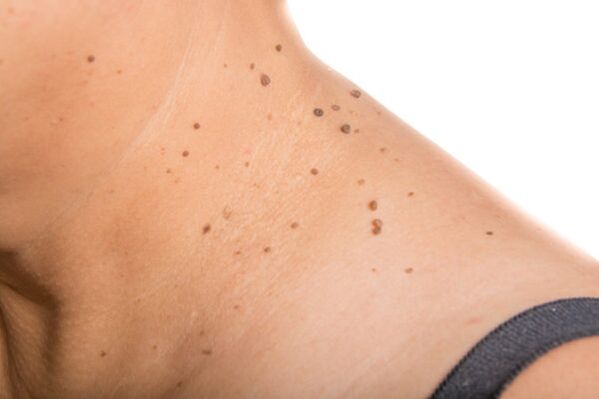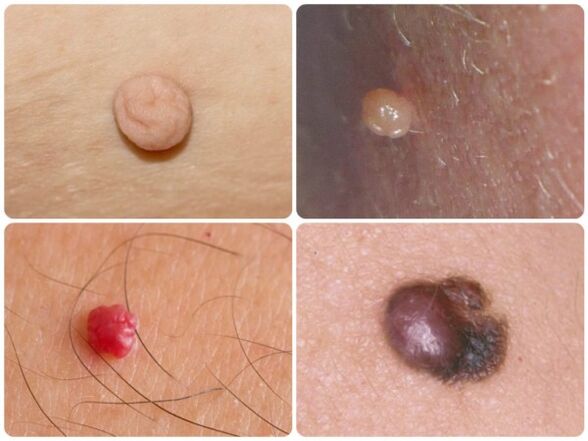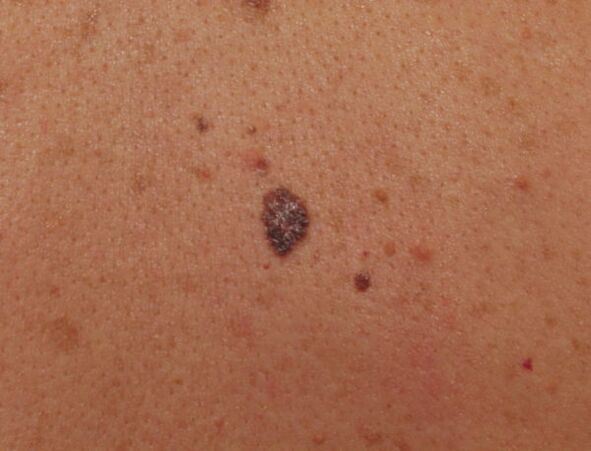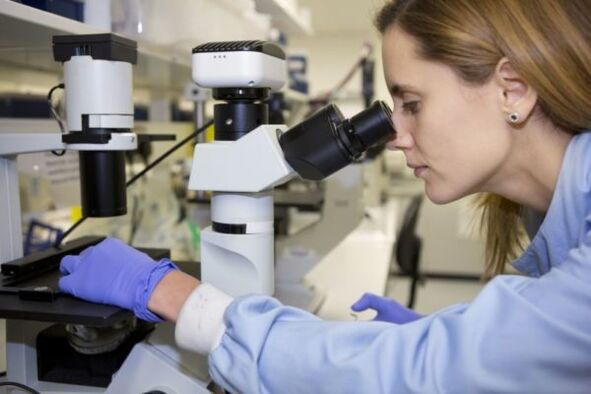Papillomas on the neck do not create noticeable discomfort, but spoil the appearance. These neoplasms grow when the human papilloma virus (HPV) enters the body. The only exceptions are growths that are often damaged. To get rid of a papilloma on the neck, specialized (usually surgical) intervention will be needed.

Causes
Papillomas are benign neoplasms caused by HPV infection. Doctors isolate more than a hundred viruses that can cause such growths to appear on the body. Hanging nipples of small sizes often appear on the neck, reaching 2-3 cm in diameter.
Human papillomavirus infection occurs through direct contact with an HPV carrier. It is also possible to transmit the pathogen through personal hygiene items or clothing. The virus can enter the baby's body in the womb or during childbirth.
The likelihood of a papilloma directly depends on the state of immunity. With a weakened body's defenses, the first growths appear a few days after infection.

The reasons for the appearance of neoplasms on the neck are:
- frequent damage to the skin epithelium;
- allergic reactions;
- severe stress;
- respiratory diseases, helminthic invasions;
- long-term use of a number of drugs;
- overweight;
- bad habits;
- non-compliance with hygiene rules.
In women, hormonal imbalance during pregnancy, menopause, or due to taking contraceptives is considered one of the common causes of growths.
If small growths appear on the neck, then often no specialized treatment is needed. In the absence of exposure to provocative factors, such warts disappear without external intervention in three years.

Types and symptoms
From all types of papillomas on the neck, the following types of growths appear:
- Filiform- they look like small protrusions with a yellowish surface. In the future, a leg appears through which the growth attaches to the skin. Filiform papillomas are flesh-colored or light brown in color.
- Stan- formations of this type protrude slightly above the cervical surface. The color of straight growths does not differ from the shade of adjacent tissues. Over time, they merge with each other, thus increasing the affected area and sometimes the itching.
- Keratopapillomas- occur mainly in people older than 30 years, they are round or longitudinal.
- Seborrheic- differ in the presence of a scaly surface. These growths are often painful.
- Simple (vulgar)- This type of papilloma is localized on the upper limbs, but sometimes grows on the neck or face. The growths look like rounded nipples, which protrude significantly above the skin.
Most papillomas are single. But in the case of injury to the affected area or on the background of severely weakened immunity, the virus spreads to new areas, leading to the appearance of more neoplasms.

Papilloma growth is not accompanied by severe symptoms. In rare cases, virus activity causes:
- itching;
- burning;
- bol.
When the problem area is injured, the affected areas begin to bleed.
Possible consequences
Complications caused by the activity of the papilloma virus are often caused by the action of the carrier of the infection. Frequent growth injuries cause:
- Development of papillomatosis. This pathology is characterized by multiple growths that form on a small part of the body. In extreme cases, the entire cervical region is affected. This is explained by the fact that each wart contains the smallest virus particles, which, when the neoplasm is injured, spread to healthy areas.
- Degeneration into a malignant tumor. Malignancy is also more often the result of neoplasm trauma. The damage leads to the development of an inflammatory process in problem areas.

Papillomas on the neck are more often exposed to external influences, which causes open wounds to form on the skin. Due to that, the affected area is often infected with pathogenic bacteria, which leads to inflammation and fertilization of the epidermis.
Therefore, if the wart breaks off and bleeding begins in the problem area, it is necessary to treat the damaged skin with an antiseptic composition and close it with a bactericidal patch. In addition, it is recommended that you consult a dermatologist within two to three days to rule out the possibility of complications.
Diagnosis
Papilloma virus causes characteristic growths. However, in some cases it is not possible to distinguish warts from other similar neoplasms.
In order to exclude other diseases that manifest themselves in the form of skin rashes, the following diagnostic measures are performed:
- PCR (polymerase chain reaction). It allows not only to diagnose the presence of the virus in the body, but also to assess the likelihood of tumor degeneration.
- Histological analysis. It is prescribed for suspected malignant tumors.

The Digine test is considered more effective. This method is very sensitive and provides information on the presence of papilloma virus, strain of infection and degree of oncogenicity.
Therapeutic techniques
To remove papillomas on the neck, you must visit a dermatologist. Self-involvement in the removal of neoplasms from the skin is not recommended. This is especially true in cases of multiple tissue damage, indicating a state of immunodeficiency.
Hardware techniques and medications are used to treat papilloma virus. The latter cope well with individual growths of small size.
Drug therapy
Drug therapy is carried out mainly using topical preparations.
You can use special pharmaceutical products to quickly remove warts from the neck.
The use of medications does not always help in removing the papilloma. Moreover, this method of treatment does not exclude the possibility of neoplasms appearing in the same place.
Hardware techniques
The following hardware removal techniques are used to remove neck papillomas:
- Laser coagulation- allows the removal of neoplasms from the skin with minimal risk of infection or bleeding.
- Cryodestruction- The procedure involves treating problem areas with liquid nitrogen, which destroys tumor cells.
- Electrocoagulation- tumors are removed by exposure to high frequency current. This method is more painful than previously described.
- Radio wave removal- the method allows not only the removal of the tumor, but also the taking of tissue for subsequent histological examination.
In rare cases, removal of the tumor from the neck is performed by surgery.
ethnoscience
Treatment at home can be done with folk remedies. They help remove not only the smallest tumors, but are also effective in combating large growths.

Dealing with neck papillomas will help:
- olive or castor oil. It is necessary to lubricate problem areas with this tool several times a day;
- apple cider vinegar or ammonia. Any of these agents must first be applied to a cotton swab and applied for a few minutes to accumulate. The procedure should be performed at most once a day;
- aloe juice. They must soak a cotton swab that is applied to problem areas and held for 4-5 hours;
- tea tree oil. It is enough to apply two drops of the product on the skin neoplasm daily;
- celandine tincture. To prepare it, you need to mix vegetable juice with water in equal proportions. The product is infused for two weeks in a dark place. The resulting drug should be drunk every day for 15 drops.
Regardless of the chosen method of combating papilloma virus, treatment must be supplemented by measures to strengthen immunity. For that, it is recommended to take vitamin complexes and immunomodulators. From traditional medicine, decoctions from herbal preparations of lemon balm, plantain, dandelion root and other plants help strengthen the immune system.
Prophylaxis
It is very difficult to prevent human papilloma virus infection. But if you follow the rules of prevention, you can avoid the appearance of neoplasms on the body. This requires:
- wash hands and body daily;
- Healthy food;
- timely treatment of diseases;
- rejection of bad habits;
- lead an active and healthy lifestyle
If warts appear on the neck, a doctor's examination is recommended to rule out malignant neoplasms. Be sure to consult a dermatologist if the wart has changed color or more growths appear on the skin.























